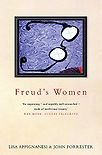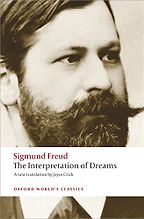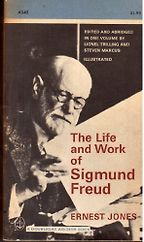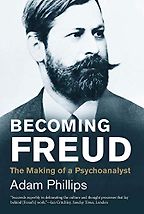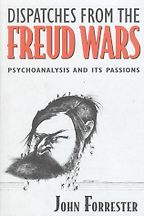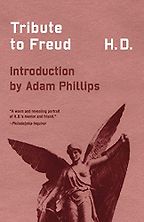Before we go into your five book choices, could you say a little bit about your personal involvement with Freud? I know you’ve been involved in a number of ways with Freud and Freudian projects.
I guess I first directly engaged with Freud as a reader. That’s an intimate relationship, isn’t it? I studied literature at university, back in the sixties and inevitably Freud came up. I read more when I was writing my PhD—about femininity. Then, by sheer coincidence, I went to work at a social research firm in New York. This was back in the early 70s. The woman who had brought me in and was one of the partners of the firm was the daughter of a leading psychoanalyst. So I started to learn about psychoanalysis in a different way by meeting analysts, and I grew a little more familiar with a way of thinking. I was a writer in residence for this firm and the book I wrote based on their research was then published by a psychoanalytic press who asked me if I would become their outside editor and so, by a series of accidents, I learned about a field I hadn’t started out to learn about.
Can you say the title of the book in passing?
Language of Trust. It was based on intergenerational research at a time when one of the great unravellings between the generations was taking place: Vietnam, the growth of popular culture, political movements were all in play. We were all interested in Freud back then, whether for or against. Later, when I was a director of the ICA, someone recommended John Forrester to me when we were running a series on Freud and Lacan: we eventually got together… Some years back, I served for some years as chair of the Freud Museum in London. I’m also on the ‘Scientific Board’ of the Berggasse Museum at Freud’s old home in Vienna.
And in your writing?
Well, Freud is like the weather. He’s everywhere. If you look anywhere in our culture his ideas will appear, even if they’re not named as his ideas. Once you’ve read him, you say to yourself ‘oh that that’s where this has come from,’ even though it may not be publicly stated or cited. So, of course, Freud has come into my own writing, both as the subject of books, say Freud’s Women (with John Forrester), and as a kind of hazy presence in fiction and memoir. I edited a book of Joan Riviere’s translations of Freud and, in fact, I’ve just put together a book on Freud and Psychoanalysis which is a grouping of John’s introductory lectures on the subject. It will be out in the spring.
Is it fair to say you’re a passionate reader of Freud? Do you love Freud, as a writer?
My relationship with Freud has always been first as a writer, and then as a thinker and inventor of a practice; the latter when I’m being a historian. But the first is key—it’s a little like my relationship with Proust. I don’t lecture much, so chapter and verse are not always in my mind. Like Proust, Freud for me is the kind of writer that you can just dip into through life. You open a page, and suddenly you’re enthralled, you run off into a thought. Each time I read Freud, it feels fresh and new, and I go, ‘Oh, oh, really?’ I’ve always been surprised at the various inflections in his work, and where his thinking takes you. And I like to argue with him. He’s one of my Greats.
Let’s turn to your first book. You’ve chosen The Interpretation of Dreams, which is a classic, slightly unwieldy Freudian text…
I chose it because I like to think of Freud’s own trajectory, Freud biographically, personally. After all, the first analysis is his self-analysis. There would probably not be psychoanalysis or even our therapeutic times without that. Then, too, Freud is a great literary modernist. I stress ‘literary’, because Freud actually experiments with form; he infuses scientific and medical thinking with literary form.
He trained in science. He trained as a neurologist before he became a doctor. He’s interested in physiology, in the anatomy of the brain, in aphasia. He’s interested in all these things, and early on does experiments on eels. He’s interested in facts and hypotheses. But when it comes to thinking about patients and understanding the people who come to see him in his early days of practice, let alone attempting to understand himself, he both turns to literature and writes ‘with literature,’ with his own wide reading. He invents the genre of the case history, a kind of composite between a medical case and a short story.
With The Interpretation of Dreams, he invents a special kind of confessional, reflective, meandering narrative genre, through which you can both argue theoretically and also look inward and write about the self and the way the mind works. Through this book you see how the Freudian self takes on layers and layers of significance. He leads us not only into dreams and their occluded meanings, but into memory: for Freud, the most important dreams take you back into childhood. These memories of childhood are woven into fresh understandings of childhood experience and more generally into ideas of how dreams hide meanings and how interpretation can take place. I always think of Proust in relation to Freud because of this focus on memory, but Proust never read Freud. Joyce did.
“Freud is like the weather. He’s everywhere”
We could ask where Freud’s thinking about the Oedipus complex came from. It came from observation of his own family life to begin with. But why Oedipus? Freud had a proper gymnasium education and was steeped in the classics. He’d read Sophocles and Oedipus very closely as an adolescent. So he uses the great literature, the great literary characters that are familiar to him. This usage is akin to what other modernists do. Joyce, in Ulysses, gives us an odyssey through dear, dirty Dublin, where God is a shout in the street. Freud too looks through the ordinary, the detritus of everyday Viennese life—dustbins, hidden, discarded matter, the refuse of the day metamorphosed into dream. This is where meaning or clues lie. Dreams, missteps, mis-directions, mis-sayings, mis-rememberings, mistakes: all are matter to be interpreted. The individual’s symptoms, blocks, repetitions, obsessions, fixations, are nudged into new directions by uncovering such matter through language, through freely associated language. Freud’s dream book is thus one iteration of autobiography—memoir as discovery through the interpretation of those insignificant things shared by all, dreams. And within that personal investigation, Freud interpolates a universalized scientific treatise. The Interpretation is science, plus literature, plus an analysis of the self.
Freud’s convoluted dream narratives are such fun. You get this extraordinary portrait of Viennese life through them, of his own childhood history, too. One of his own dreams starts with the sleeping Freud in the train station watching a former Austrian prime minister getting into a far better carriage than Freud has got, one undoubtedly reserved for free—while Freud has had to pay for his… The prime minister’s carriage also has a new loo in it and needless to say, Freud’s doesn’t. Freud describes all this in a graphic way. The dream feels like reality. In the middle of this dream night, Freud has to go and pee, something we all do, though it hasn’t perhaps been a regular subject for literature. (Remember ground-breaking Ulysses begins with a piss). These bodily matters are key Freudian subjects, hidden within our social lives. Excreta, the things we pay little attention to or find dirty, take on a significance. The Count Thun dream (as it is called after the prime minister) ends up taking us back into Freud’s childhood in Moravia in what is now Czechoslovakia. As a small boy, around four years old, he wanders into his parents’ bedroom at night, and finding that he needs to urinate does so in his parents’ chamber pot. At which point his father says, ‘this child will amount to nothing.’ Freud names this as a wish fulfilment dream, one of his core ideas about the function of dreams, because Freud desperately wants to prove to his father—who is at the core of his writing of The Interpretation, begun after his father’s death—that he hasn’t amounted to ‘nothing,’ he has a relation with Count Thun…. So there’s a kind of joke at play here, a wish, various layers of being and meaning. All within a narrative that mixes up the kinds of languages in which writing, argument, thinking, and story take place.
It is impossible to dip into The Interpretation of Dreams without starting to reflect on your own dreams. I started remembering my own dreams better while I was reading it. It’s a way of focusing.
I think there’s a kind of contagion effect to a lot of Freud’s writing: we all have dreams and when we read about them it stimulates memory of our own… just as when we read about the family romance or daydreams or the id/ego/superego we’re drawn to think about our own. Freud is very interesting in the way in which he sets up his narrative structure in The Interpretation of Dreams. There’s a way in which he constantly argues with the very ideas he puts forward, says, ‘no, no, that’s wrong,’ then takes you somewhere else. And because he’s arguing with himself, you find yourself defending some of his arguments or attacking alongside him. Over the expanse of his work, you realise that he changes his mind and feels free to do so. Ideas are never carved in stone: they’re hypotheses. Up until the age of 50, he constantly rethinks himself and the ideas that make up psychoanalysis. He draws us into refuting him and resisting him. And then, in a sense, he gives way and says, ‘your refutation is my refutation, as well. Here’s a different version.’
So, let’s move on to your second choice, which is the classic biography of Freud by Ernest Jones. I guess it was an authorized biography wasn’t it?
Jones certainly had access to things that weren’t available in the public sphere again for many, many years within the voluminous Freud correspondence. He liberally used Freud’s letters to his wife, Martha—he saw an unabridged version of those. He had all his own letters from Freud. Ernest Jones was a very important part of the psychoanalytic establishment, certainly in Britain, where he set up the psychoanalytic society and the training institute. He was an editor of the international journal. He did a lot of ambassadorial jobs within the larger psychoanalytic movement.
What I like about this biography, which has been disputed by Freud detractors in particular, and has been overtaken by different ways of writing biography, is that it has a huge energy, an aliveness. This is somebody who actually knew Freud over many years and pretty well, telling us about his mentor. Jones was 20 years younger than Freud. Not only did he know Freud and his family and all the first players within psychoanalysis, but he has a very lively knowledge of them. He feels unafraid to me. He doesn’t feel like somebody who’s been cowed into taking a particular view, which perhaps Anna Freud or others might have preferred him to have. He’s pretty adventurous at the same time. This was a book which, when it first came out, was considered to be part of the warts-and-all school of biography. Now that we’ve had so many decades of Freud detractors, and styles of biographical writing have changed, it feels much more like an idealizing biography. It was, in any case, the first Freud biography in English and the first big biography to deal both with the life and the ideas. Later biographers of Freud tended to separate out the intellectual biography from the lived biography, which is perhaps odd in itself, since a lot of psychoanalysis is based on self-interpretation.
Freud made himself very vulnerable by analysing himself in public. It’s almost inevitable that somebody who does that is going to fall short against factual records of what happened in his life and any discrepancies are going to be in full view.
Absolutely. On top of that, it’s not always clear what happened in real life. Our biographers can’t chart our day-to-days. We can barely remember them ourselves. These things are not straightforward. But what Jones did is lay down the main tropes of Freud’s life, as it was seen through the 20th century, with timelines attached. There are three volumes and three periods, the ideas that come out of them, and the kind of character that emerges from them—all skilfully written and filled with detail as well as, often enough, Freud’s own humour.
So the young Freud is a dreamer. In the big sense, as well as in a localized, what-I-did-last-night sense, a dreamer and an adventurer, a kind of Don Quixote figure, although he becomes more of a Sancho Panza as the descriptions of him go on. He’s an adventurer, a rebel and brave in this first period of life. On top of that, there’s his love affair with Martha, which lasts for a frustrating ‘forever’ in the way of Viennese life at the time, where you had to have enough money to set up house before you could marry. You feel the need for a change of convention in the passion of Freud’s letters, theorized later, when he makes his attack on ‘civilized sexual morality’.
The Freud of ‘maturity’ of the second volume (1901-1919) is the Freud who sets out the finer points of theory and practice, becomes internationally important as a thinker, but also becomes involved in painful dissension with his ‘followers,’ perhaps most importantly with C.G. Jung. Finally, in ‘the last phase’ a sharper image of Freud the stoic comes into view: this is the Freud of illness as well as a final burst of new ideas, a repositioning of his theory with the ego, id and super-ego and Beyond the Pleasure Principle; and then the painful coming of Nazism and exile.
He wrote on the theme of modern sexual morality, about what the consequences were particularly of men having to wait to have legitimate intercourse with a woman.
Yes, ‘civilized sexual morality’ had psychological consequences: it tried to keep certainly middle-class women long ignorant of the facts of life, it delayed marriage, induced female frigidity and/or the development of the kinds of symptoms Freud and Breuer write about in the Studies in Hysteria. It instigated and kept in place a double standard which served neither gender very well and made women’s lives far harder.
It strikes me that Freud had an interesting life. It may have been painful for him in many ways, but with the late exodus from Vienna, he had a third act that lots of thinkers don’t really have.
There’s been an interesting biography called Saving Freud, about him as an exile. It’s recently come out and it depicts the harrowing last years of Nazi ascendancy in Vienna and the many people who came together to save the Freud family and facilitate their exodus from Vienna to London. Princess Marie Bonaparte was key. When Freud arrived in London—he was very frail by then—he was thrilled to be able to ‘die in freedom’ as he quipped.
He wrote that amazing line on leaving Vienna to come to London and the Nazis made him sign a record book. I can’t remember exactly what he wrote, something like, ‘I’d recommend the SS to anyone.’
Yes. The Nazis had raided the Freud home (and of course before that had destroyed the press). Large sums were necessary to permit the family to leave Vienna. Before leaving, the Gestapo made Freud sign a testimonial to the fact that he had not been mistreated by them, but had been treated with ‘respect and consideration’. Freud signed and added beneath his signature, ‘I can heartily recommend the Gestapo to anyone.’
Freud had a lively and very dry wit. He doesn’t just write about jokes and the psychopathologies of everyday life, slips, and so on. He is witty, great at words that carry multiple possible meanings: there’s humour as well as great stoicism in his character. But the ongoing cancer, the thirty-four surgical procedures to his jaw, the prosthesis, the huge pain were no joke.
Let’s go to your third book, Adam Phillips’s biography, a much more recent book.
Adam Phillips is our finest writer about (and with) psychoanalysis. His Freud biography is scintillating, in part because it’s an anti-biography. He takes on Freud’s own anti-biographical stance: Freud himself, as we know, was against biography, at least his own (Given that a single dream can take thirty pages to describe, if a stranger could even access it, biography becomes something of an impossibility). Then, too, most of lived life is hidden from biographers. So what’s the point of the procedure? In any case, it’s clear that Freud didn’t want to be written about in that way. He was a great destroyer of what would have become his early archive and periodically tore up all early letters and papers, shedding a skin perhaps. It’s an interesting position for a man who rummages in the attics or basements of other’s narratives.
Adam Phillips takes on Freud’s suspicions of the biographical project and yet writes this wonderful biography of the early Freud. He gives us a two-page summary of Freud’s entire life—that’s it, those are the facts. Then he focuses in on childhood, the early life, and the world in which Freud lived through to the period of The Interpretation of Dreams, and the key texts up to 1906: The Psychopathology of Everyday Life, Jokes and Their Relation to the Unconscious, and Three Essays on the Theory of Sexuality. His contention is that if Freud had stopped there, the world would still have a full theory of psychoanalysis. What it would not have is the movement Freud and his followers then went on to create and the reification of psychoanalysis through an institution. Phillips prefers the aliveness of the first adventurous Freud to the man engaged in followers and a movement.
Get the weekly Five Books newsletter
He ruminates on Freud’s Jewishness, the ways in which migration at the early age of four from a small town in Moravia to Vienna played into Freud’s sense of the world, his ability to penetrate and conjugate marginality. He probes the kinds of things that Freud internalized as a Jewish child, not a believer, but equally not a belonger within the society in which the family found itself. This is, in effect, a biography of how psychoanalysis came to be through Freud’s responses to and internalization of the everyday world he inhabited as a child and secular Jew, in a society which finds both child and Jew unruly, foreign, incomprehensible, dare we say, hysterical. In Phillips’s brilliant interpretation, the scientist’s test tube is replaced by the hysteric. Freud becomes absorbed in showing us ‘how ingenious we are at not knowing ourselves.’ And how knowing ourselves can become the problem rather than the solution.
When Phillips writes it, the marginalization of Jews in European society—their never quite belonging, never quite knowing what’s important in terms of status, the challenge they face in overcoming all these things, their experience—becomes key to the areas Freud’s psychoanalysis sets out to understand. So the marginality of the Jew and the child, both outsiders to the settled adult world, become key to Freud’s thinking. Since we increasingly inhabit a world of ‘migrants’, of dispossession and margins, his thinking again seems fresh.
Adam Phillips has a very light touch and he’s somehow managed to reach a very wide general readership while talking about some of the most complex and difficult aspects of the mind.
He’s a wonderful writer, and he’s a writer who is eminently quotable as well, because he himself has a tendency to be not only witty, but paradoxical. That allows him to include a great deal within one sentence. And he loves paradox, that core Freudian position of ambivalence. He quotes Charcot, for example, in this book, “theory is good, but it doesn’t prevent things from existing.”
Anyhow, it’s a radical biography because it stops short, before you move on to the psychoanalytic movement and the training institutes of psychoanalysis. Adam Phillips’s own position is that the most interesting part of psychoanalysis lies with younger Freud, that period of dreams and adventure and a kind of radicalism which doesn’t allow itself to be institutionalized.
Your fourth book is by your late husband, John Forrester, Dispatches From the Freud Wars.
I apologise for choosing it, but it seemed to me on rereading it that this book is actually a wonderful way into Freud, and not only into Freud himself, but all the ideas and the wars, the debates that have happened around Freud. I don’t mean just the wars about whether Freud said this or that, and the claim that it’s not a science, but also the epistemological ones and how one thinks about them.
John Forrester manages to bring in a lot of the languages—many of the places where Freud is thought about or used, into one space. There’s the scientific Freud, the philosophical, epistemological Freud, the Freud of history, and more. He has all these disciplines to hand and brings them into the discussion with one another.
The subtitle is ‘psychoanalysis and its passions.’ It’s really interesting the way it inflames people for or against. It’s reaction formation in Freud’s terms, perhaps. There’s something incredibly stimulating about Freud even for people who don’t like his work.
Yes, that’s a very interesting point. I think it’s to do with the fact that Freud writes about the things we all live and think, and therefore, we think we know about, certainly when it comes to ourselves. For example, that strange ordinary thing called sex which is far more than an act but is caught up with childhood, family, fantasies, memories. So we resist Freud and by doing so also engage with him passionately. But I think it’s also to do with Freud’s place in popular culture—for example, the Freud of the movies, which John manages to take on board in these essays. Freud is a familiar: we all think we know Freud whether it’s through hearsay, The Sopranos, therapeutic culture or by having read him. Everyone has views and feels strongly, passionately about Freud, since Freud is also about your self.
Five Books interviews are expensive to produce. If you're enjoying this interview, please support us by donating a small amount.
There are brilliant essays in this book. There’s one on justice, envy and psychoanalysis, which begins with the story of wise King Solomon and the two arguing women, prostitutes, who come to him with a child. These two women have each recently had a child. They sleep side by side and one of the children has died overnight. Each insists that the living child is hers and it’s up to Solomon to judge whom the living child belongs to. He states that since they can’t agree, the living child should be cut in half. One woman says that’s a good idea, the other screams, ‘No, no, no, give it to her.’ So Solomon knows who the mother is. John Forrester uses the story to tease out the way in which envy, that foul emotion, is the motor of justice and fairness. The mother of the dead child would prefer that neither of the women have a living child so that they can be equal. The essay takes us into the philosopher John Rawls and much more. It’s a wonderful illustration of how Freudian thinking can be used to navigate us not only into the psyche but into politics, as well. It’s a very witty piece.
Hearing about all those different aspects of Freud being pulled into one place—it’s a kind of cliché, but how many thinkers have affected so many different areas of culture? It’s quite remarkable. Is there any last thing you’d like to say about Forrester’s book?
I think it’s worth just noting the very diverse terrains that Forrester leads us into. One of the essays is about Ferenczi, one of Freud’s followers and his relationship, relayed through Ferenczi’s analysis with Freud, with a mother, who is Ferenczi’s lover and her daughter. The essay takes us onto the subject of incest: what does the taboo on incest mean? What do you do with that taboo in a world of extended families? And what does this mean in terms of transference within analysis? Then there’s a wonderful essay on Freud the collector. Freud collects ancient objects, but he also collects dreams and he collects jokes. In that sense, he is a varied collector and only gradually moves on to collecting those things that are materially tangible.
That’s a really interesting perspective. Especially when you see Freud’s house, the whole house is like a cabinet of curiosities.
It’s a dream museum. One of my favourite essays in Forrester’s book is called “A Whole Climate of Opinion,” which explores the way in which Freud becomes common knowledge, and has actually moved through all the various disciplines, as well as into popular culture, where he has a prominent place amongst people who’ve certainly never read him and never want to read him. But he’s just there. He’s there in the cinema, he’s there in any number of TV series without necessarily being mentioned or simply by having the name invoked. He is there as a body of ideas, but also in that extraordinary ‘therapeutic’ twosome that Freud launched onto the world—the analyst and the patient, the listener and the free speaker who talks about his life.
Presumably, you and John talked about these themes.
I guess we must have… We wrote a book together called Freud’s Women way back. And we read and sometimes edited each other’s work. But when I go back to the books after time has passed, I always find there’s a freshness in them, of argument and sources too. It’s a pleasure to go back and dip into it again.
The final book is Tribute to Freud by H.D. Tell us who H.D. was because not everybody will know that.
H.D. was an American poet who lived largely in Britain, but spent time in Greece as well, and in Vienna for her analysis with Freud. She was a young American, who loved classical antiquity and myths and, in her second year of university, met Ezra Pound. They became engaged and Pound promptly declared what she was doing in her poetry to be imagist and eventually transmuted her name, Hilda Dolittle, into ‘H.D.’ in the same way that he gave Eliot his ‘T.S.’ (Pound was a great cutter, one might say, and it may indeed be the essence of editing). H.D. in London married Richard Aldington in 1911 and was part of the Bohemian scene before and during the First World War, a friend of D. H. Lawrence and Frieda’s. She was highly strung, very beautiful, a modernist who wrote not only poetry but very elliptical prose, had a visionary ability and a spiritual inclination. Her poetry during the First World War pulses with a sense of the over-abundance of death in the external world and in her own more intimate one.
The stillbirth of her firstborn is linked for her with the tragic sinking of the Lusitania. Not long after, her brother died, and then her father. The concatenation of historical and personal circumstance made her very, very fragile: she started to hallucinate. There were ups and downs but by 1933, she experienced a serious set of hallucinations, which she understood as real events. She was bisexual and had several lesbian relationships, the most lasting one with a writer called Bryher, who was a very popular novelist and also had family money. Bryher took care of H.D. and her daughter Perdita (by Lawrence’s friend, Cecil Grey). They travelled together. It was Bryher who arranged for her to see Freud.
H.D. comes to Freud in 1933 to be analysed and has sessions over 1934/35. Ten years later she writes this tribute, the book I’m recommending. She began it in 1944 after Freud’s death.
From dipping into the book so far, she must have been taking extensive notes. It seems almost as if she’s transcribing.
Most editions contain a second part, which are her notes from her analysis. Freud didn’t want her to take notes. He never wanted people to take notes, because it made that activity more important than the actual therapy. In fact, the notes that she takes are not as interesting as what she finally writes in the main body of this short book. The reason I’ve chosen this one is not only that it gives a woman’s point of view of Freud, at last, but also that she’s somebody who is steeped in literature and in art and has a real aesthetic sense about Freud and a world we most often see from a very different viewpoint.
I think what she catches, because she is so good at free association in her own work, is the play (and playfulness) of free association within an analysis, the way Freud’s voice takes on real moment when he makes an intervention, in that what he says is never just assimilable as one thing. It operates on several levels. So, if he says ‘time’ it doesn’t mean just ‘look, it’s time to go now,’ it has all kinds of other associations that go back as far as her childhood. Each of his interventions, each bit of interpretation as she presents it in his voice, takes on weight. So she characterizes Freud, his courtesy, his playfulness with its resonances, very beautifully.
I like this phrase she used to describe a particular look of his: “he smiled, his ironical, crooked smile.” It’s not just the words he speaks, but it seems so much of the analysis is bound up in Freud’s facial expressions.
We always now think—because of the American example in the 1950s—of the analyst as being completely mute, a blank screen, when they’re being ‘classically’ Freudian. Freud was not like that. Depending on who the patient was, he treated them differently. He called H.D. a student rather than a patient. He was very gentlemanly, serious, but sometimes almost flirtatious in an old man’s way. He takes her into his personal world, partly through the objects in his study which are from the antique world she knows so well. For instance, he says to her, ‘You’re the first person who’s come to me for analysis who has looked at my gods (or goods) before you looked at me.’ They keep punning; both of them pun on all these figurines that he’s got on his desk and around the consulting room, which are both gods and goods. He says to H.D.: ‘Because I’m old, you don’t think of me as a man.’
And this idea that he’s too old to be treated as a ‘man’ becomes a theme of their analysis. All this weaves itself into the way she begins to think about herself. The particular comment about ‘gods and goods’ takes her into her childhood, the family religions, her own spiritual inclinations, as well as into the material world, and the difference between the two. He also says to her something like ‘he doesn’t relish being treated as the mother in analysis’.
That’s revealing.
Yes, and these are things she remembers and become very important to her. I imagine Freud says them, if she’s accurate, as a spur: certainly whatever it is he says has effects on her when she thinks about the self, about sexuality, her hallucination and so on. This is a fantastic text in terms of taking us into the epicentre of the consulting room and its ongoing resonances.
As you say, she’s an interesting writer. It’s not just that she’s somebody who happens to have been analyzed by Freud. It’s also the way she describes it. There’s a line quoted on the back of the edition of the book I have: “My bat-like thought wings would beat painfully in that sudden searchlight.” She writes very poetically about her experiences.
She sometimes makes allusions to Shakespeare too, as Freud does. And these became part of the analysis. H.D. incorporates all this into the richness of her text and actually gives you a flavour of analysis in a unique way. Ernest Jones reviewed the book when it first came out and said it was the most extraordinary piece of writing about analysis, because it was not done by a professional, and yet, it gives a complete aura of what it means to be in analysis and with Freud.
Do we know if it liberated her into becoming more effective as a poet, or whether she was just stuck at that point?
The crucial thing is she was suicidal but carried on working after the analysis. She was in a moment of crisis when she came to Freud, and in that sense the analysis worked. One of the tropes of their analysis was that she wants to give him something, she tries to send him a birthday present, but she doesn’t find the right flowers: there are no gardenias in Vienna, the flowers she knows he loves most having found them first in Rome. The Nazis are increasingly in control of Vienna; there are swastikas falling from the sky. She describes this as confetti—and each bit of confetti has a message that ‘Hitler will bring you food’, this kind of thing.
Get the weekly Five Books newsletter
That sounds almost like a dream.
Yes. She walks every day from her hotel to Freud’s house, and she daydreams the street or she dreams poetically about the street. And she wants to find the perfect present for Freud’s birthday. But she can’t. When he flees to England, she finally, for his birthday, manages to send him gardenias. But she doesn’t append a note to the gift. She wants only to thank him for everything he’s done. But he knows and he writes her a note to say, ‘This could only be from you.’ The whole aura of intimacy H.D. conveys is so interesting.
It’s a love story!
Yes. She calls it a tribute and I think that’s a good word too. There’s one other tribute to Freud, that’s by Andreas-Salomé. That, too, is quite extraordinary. I think the women who were in analysis with Freud, when they wrote about him, had a different take than the men. They were sensitive to different things. Different things are foregrounded about Freud and about analysis. That makes these writings hugely interesting.
Five Books aims to keep its book recommendations and interviews up to date. If you are the interviewee and would like to update your choice of books (or even just what you say about them) please email us at [email protected]

